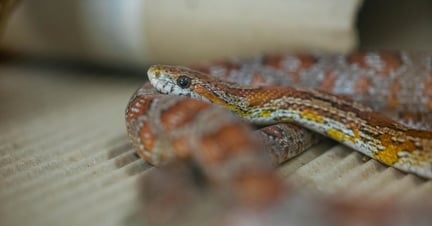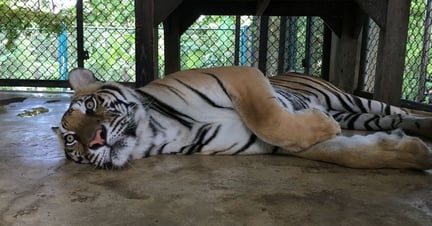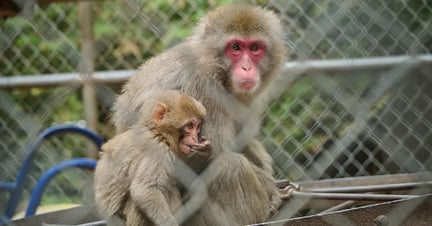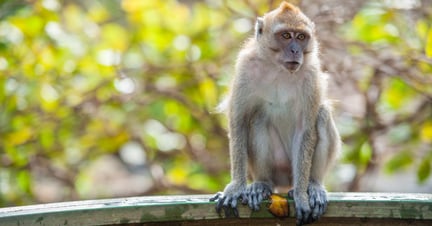
World Animal Protection is calling for an immediate end to the global live animal export trade following the catastrophic situation aboard the Spiridon II, where nearly 3,000 cows, around half of them pregnant, have been trapped at sea for more than two months.
The vessel departed Uruguay for Türkiye with 2,900 cows, but after being blocked from unloading due to administrative issues, it has been forced into a 30-day return voyage, prolonging the suffering of the animals on board.
Based on media coverage, which is challenging to fully verify, reports indicate that:
- 58 cows have died
- 140 pregnant cows gave birth or miscarried
- Around 50 calves are reportedly on board, with the fate of the remaining 90 unknown
- Decomposing bodies are reportedly still aboard, creating severe hygiene and disease risks
This is one of the worst live export incidents since MV Bahijah (2024) and MV Gulf Livestock 1 (2020). These events show that the trade is inherently cruel for animals and dangerous for people.
During these long export journeys, many animals are reported to experience exhaustion, heat stress, starvation, dehydration and infection, in conditions that violate the most basic welfare principles.
The tragedy has drawn international attention, highlighting the cruelty and systemic failures that enable disasters like Spiridon II.
A cruel trade that cannot be made safe
Scientific evidence shows that animals are sentient beings who feel fear, pain, stress and discomfort. Forced confinement on unstable vessels — often not purpose-built for animal welfare — denies them any chance of expressing natural behaviours and exposes them to severe distress.
Live export exposes animals to:
- prolonged suffering
- overcrowding
- extreme temperatures
- injuries, disease, and death
- lack of food, water, and ventilation
Ships carrying live animals are twice as likely to suffer total loss compared to standard cargo vessels, making maritime transport particularly hazardous.
The Spiridon II crisis is not an anomaly — it is the predictable outcome of a system that treats living beings as cargo.
A systemic problem requiring systemic change
Live export is inseparable from factory farming, a system that produces vast numbers of animals in inhumane conditions and ships them across the world to be slaughtered, fattened or sold in markets with weaker protections.
It also facilitates the global spread of zoonotic diseases and antimicrobial resistance, placing both animals and people at risk.
World Animal Protection advocates for a transition toward:
- plant-based proteins
- trade in meat and carcasses, not live animals
- transport of semen or embryos instead of live breeding animals
These solutions already exist. What is needed now is the commitment to put them into practice.
What is happening aboard the Spiridon II is not an accident — it is the result of an intensive animal production system that ignores the basic truth that animals are sentient beings. These cows feel fear, pain, and stress. No animal should spend weeks trapped on a vessel, surrounded by overcrowding, hunger and conditions that deny them even their most fundamental needs.”
“This tragedy must be a turning point. We already know what the solutions look like: phasing out live exports and accelerating a transition toward sustainable, humane food systems that respect animals. Countries like Australia and the UK have shown that leadership can end this cruelty. Now it’s time for other governments to follow suit
Countries are making the right choice for animals
Around the world, governments are recognising that live export is incompatible with modern animal welfare standards, and are beginning to take meaningful action.
Australia: Ending live sheep exports
Historically one of the world’s largest live exporters, Australia, has legislated to end live sheep exports by sea, acknowledging the immense suffering caused by long-distance transport in extreme heat and overcrowded ships. This decision followed years of public pressure and evidence of systemic cruelty.
United Kingdom: Banning all live exports in 2024
In 2024, the UK became the first European nation to ban all live exports for slaughter and fattening, eliminating a major route of suffering for millions of animals each year. The move was widely welcomed by welfare organisations and the public.
These actions show what is possible when governments prioritise animal welfare, and they set an example that other countries must urgently follow.
A call for action
The suffering on the Spiridon II must not be forgotten. It must drive global leaders to confront the reality of live export and phase it out once and for all.
Join us in speaking out for animals.
- Subscribe to stay informed and join a growing community determined to end animal cruelty.
- Support our mission to create a world where animals live free from suffering.
Together, we can change the way the world works to protect animals — forever.
Latest news
-
Nicaragua’s rise in exotic animal trade threatens biodiversity
News
Over 11,000 wild animals were exported from Nicaragua in one month, raising concerns for welfare, biodiversity, and public...
-
Seventy two tigers die in Thailand as virus exposes...
News
Seventy two tiger deaths in Chiang Mai show how captive conditions heighten disease risk and reinforce the urgent...
-
Viral baby macaque draws attention to captive primate welfare
News
A viral baby macaque named Punch in Japan draws attention to the emotional needs of captive primates and...
-
Wildlife tourism risks highlighted after Thailand monkey attack
News
A recent monkey attack in Thailand sparks renewed warnings about the dangers of wildlife encounters and calls for...



